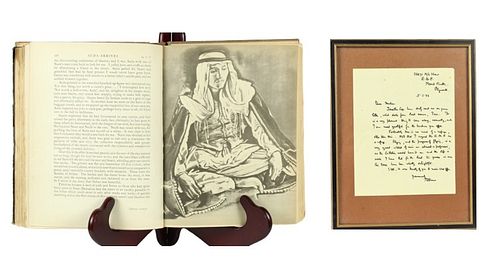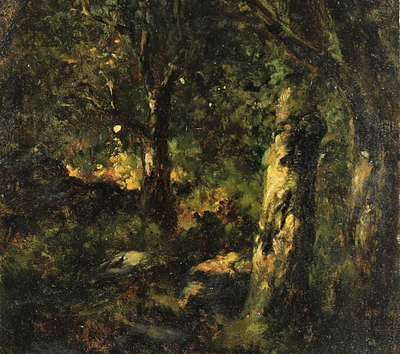Lawrence of Arabia Hand-Written Letter 1933
About Seller
522 South Pineapple Avenue
Sarasota, FL 34236
United States
Sarasota Estate Auction specializes in a wide variety of furniture, antiques, fine art, lighting, sculptures, and collectibles. Andrew Ford, owner and operator of the company, has a passion for finding the best pieces of art and antiques and sharing those finds with the Gulf Coast of Florida.
Two ways to bid:
- Leave a max absentee bid and the platform will bid on your behalf up to your maximum bid during the live auction.
- Bid live during the auction and your bids will be submitted real-time to the auctioneer.
Bid Increments
| Price | Bid Increment |
|---|---|
| $0 | $10 |
| $100 | $25 |
| $250 | $50 |
| $1,000 | $100 |
| $2,500 | $250 |
| $7,500 | $500 |
| $20,000 | $1,000 |
| $50,000 | $2,500 |
| $100,000 | $5,000 |
| $250,000 | $10,000 |
About Auction
Jul 26, 2020
Sarasota Estate Auction sarasotaestateauction@gmail.com
- Lot Description
This is a book and signed letter written by T E Lawrence, better known as Lawrence of Arabia (1888 - 1935). Lawrence was a British military officer who led the Arab Revolt against the Ottoman Turkish empire in World War I and achieved great fame for his actions during the war. The book is titled Seven Pillars of Wisdom and is an autobiographical account of his experiences in the conflict. It is a second printing of the book (1935). After the war, Lawrence joined the Foreign Office, working with the British government and King Faisal to create an Arab state that would include Syria, Iraq, and other countries in the Middle East. Faisal was a leader of the revolt and had great respect for Lawrence. In 1922, Lawrence retreated from public life, and spent his remaining years as an enlisted man, mostly in the Royal Air Force, with a brief stint in the Army. The body of the letter reads “Dear Madam ... Jonathan Cape has duly sent me on your letter, which dates from last summer, I see. It is a very pleasant thing to come along, casually, and I am most grateful for the kindness you offer. Fortunately, there is no need of a refuge, other than this. Not that I regard the R.A.F. as a refuge. Flying, and the progress of flying, is a very great interest of mine - almost a profession, as the Catholics would have it - and the life and work I have led for the last ten years in our Air Force have been wholly delightful. Still, it was kindly of you to make that offer. Yours [ ly], T E Shaw”. “T E Shaw” was the name Lawrence adopted in the 1920‘s because he grew tired of his celebrity. He stopped working with the British government in 1922 and enlisted in the Royal Air Force under an assumed name (John Hume Ross), and when the press found out about it, the RAF was embarrassed and released him from service. Lawrence found it impossible to reenlist under his own name, so he signed up as a private with the Royal Tank Corps in 1923 under the name “T E Shaw”, which was probably taken from his friendship with George Bernard Shaw, the noted Irish playwright. Somehow Lawrence was able to enlist with the RAF again in 1925 by using this new name, and he legally adopted the name in 1927. The letter was sent from Mount Batten, the Royal Air Force base near Plymouth, England. You can see the address in the upper right corner. We are not sure who wrote the letter that prompted Lawrence to write this one, but the consignor found the letter in the book when she lived in New Jersey, and she believes whoever wrote the letter to Jonathan Cape was concerned about Lawrence’s sexual orientation, and that’s why the person offered him sanctuary. There has always been speculation about his sexual orientation - some people believe he was asexual, others claim he was homosexual, but this has never really been confirmed. He was also captured and tortured by the Turks during the war and historians believe he was raped by the Turks at this time. The Criminal Law Amendment, which was passed in England in 1885, also outlawed homosexual activity by men, and it is possible the person who wrote to Lawrence through Jonathan Cape was offering Lawrence shelter from criminal prosecution for his alleged orientation. We don’t know, but it would be nice to see what the other letter said. (Jonathan Cape was the publishing company in England that handled the book for Lawrence, and Herbert Jonathan Cape was the founder of the company, and we’re not sure if Lawrence received a letter from the publishing house or from the founder of the company. Lawrence might have known Herbert Jonathan Cape personally, but we can’t say for sure about that either.) The letter is clearly written in his hand and signed by him, and it is dated May 1, 1933, just two years before he died from injuries suffered in a motorcycle accident. The letter is rare and adds to some of the historical record for Lawrence; there is very light foxing in a couple of spots. The frame is 12 3/4 x 9 3/4 in. wide and the letter is 8 1/4 x 6 3/4 in. wide.
- Shipping Info
-
SHIPPING INFORMATION·
Sarasota Estate Auction IS NOT RESPONSIBLE FOR SHIPPING. All shipping will be handled by the winning bidder. Sarasota Estate Auction recommends obtaining shipping quotes before bidding on any items in our auctions. If you are interested in obtaining any information on local shippers, please send us an email and we will kindly send you a list of local shippers. Once payment for an item has been paid to the auction house we release the items to the shippers we recommend on the invoice immediately unless otherwise noted by the buyer. Refunds are not offered under any circumstances base on shipping issues, this is up to the buyer to arrange this beforehand.
PakMail
941-751-2070
Paktara266@gmail.com
UPS Store 4074
(941) 358-7022
Store4074@theupsstore.com
-
- Payment & Auction Policies
-
Available payment options
We accept all major credit cards, wire transfers, money orders, checks and PayPal. Please give us a call at (941) 359-8700 or email us at SarasotaEstateAuction@gmail.com to take care of your payments.
-
- Buyer's Premium



 EUR
EUR CAD
CAD AUD
AUD GBP
GBP MXN
MXN HKD
HKD CNY
CNY MYR
MYR SEK
SEK SGD
SGD CHF
CHF THB
THB


























